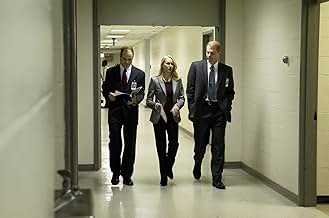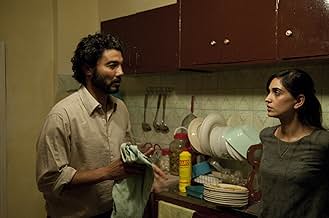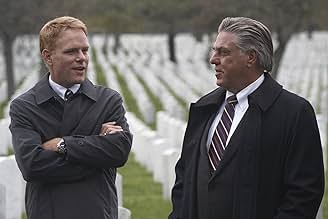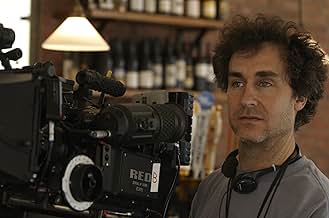Fair Game
- 2010
- Tous publics
- 1h 48min
Valerie Plame, agent de la CIA, découvre que son identité aurait été divulguée par le gouvernement en guise de représailles pour un article d'opinion que son mari a écrit et qui critiquait l... Tout lireValerie Plame, agent de la CIA, découvre que son identité aurait été divulguée par le gouvernement en guise de représailles pour un article d'opinion que son mari a écrit et qui critiquait l'administration Bush.Valerie Plame, agent de la CIA, découvre que son identité aurait été divulguée par le gouvernement en guise de représailles pour un article d'opinion que son mari a écrit et qui critiquait l'administration Bush.
- Réalisation
- Scénario
- Casting principal
- Récompenses
- 4 victoires et 9 nominations au total
Avis à la une
"Fair Game" places itself right in the middle of these controversial events between 2002 and 2004, and is told through the eyes of CIA Agent Valerie Plame (played very convincingly by Naomi Watts) and her husband, United Nations Ambassador Joe Wilson (played fiercely by the always great Sean Penn). The film's story follows how Plame goes from patriotic CIA agent diligently doing her job overseas to suddenly having her identity made public after her husband uncovered false information about a nuclear development sale between Iraq and Niger. This false information about a uranium sale between these two countries is important because it was implied as factual when Bush was listing information about Iraq during his State of The Union Speech in early 2003.
As the film starts, Plame and Wilson appear to be a very loving couple with a very strong marriage - they even have 2 small children who live with them in the D.C. area. Plame is busy traveling covertly to countries in The Middle East to shake her fist at people whom might have ties to terrorists, while Wilson is back at home, often finding himself in heated arguments with friends at the dinner table whom hold a different opinions from his own. Both Plame and Wilson appear to be relatively non-political civilians working peacefully and dutifully for the federal government - until the Bush administration decides that the country should invade Iraq. After Wilson criticizes the administration's faulty information publicly, Plame is then fired from her job, and much of the rest of the film focuses on how the couple's marriage is stressed because of what is transpiring all over the media. People harass them often when they go out, as Wilson makes rounds on the media circuit to try to restore his name. The film has a little bit of a soap-operish feel to it during the 2nd half in that it is mostly focused on the couple's relationship, but the acting performances by Watts and Penn are just so sharp that they make up for some of the film's small flaws when it comes to storytelling. There is also a small subplot involving a family in Iraq connected with Plame's counter-proliferation efforts that should have been either developed more or left out entirely, as that is the weakest part of the film - but fortunately those scenes are relatively few in the entire film.
Aside from the acting, another of the film's strengths is how it never gets too preachy towards the Bush administration, but rather focuses on the facts of what unfairly happened to Plame and Wilson from their own points of view. In fact, no actor plays Bush or Cheney in the film - we only see a few clips of the real Bush and Cheneys giving speeches on TV screens for a matter of seconds. Scooter Libby (portrayed a bit villainously by David Andrews) is seen in a few short scenes as a swindler who tries to convince CIA employees into manipulating the intelligence the way he sees it, but his characterization is very subtle, rather than as an in your face bad guy. Doug Liman's direction is also fairly fast-paced to make sure the film never gets too bogged down in pointless scenes. Even though it is very talky and dialogue-driven, the narrative keeps moving forward at a crisp pace - at least if audience members are adults without ADD (and I think it's pretty fair to say that this movie isn't marketed for the Transformers or Twilight crowd...) The film generally works very well both as an entertaining drama, spy thriller, and an educational lesson. Moreover, it's an intelligent reminder to the public of how people in positions in power in government will often stop at nothing to achieve their desired goals, even if that means illegally abusing their power through misinformation, manipulation, and character assassination. As citizens we should constantly be questioning our leaders and their motives, as well as keeping them honest and holding them accountable whenever they they violate our trust.
On a final note, I have to say that I find it very refreshing to see a film like this that has a woman in a very intelligent leading role, rather than how Hollywood films usually stereotype females in formulaic romantic comedies. It seems like women in major roles usually have their sappy characters obsessing about trying to find a man and buying shoes, with some slapstick and comedy at the dinner table with their parents thrown in as well (a.k.a. chick flicks). It's either that or the female characters get almost zero screen time, where they are relegated to simply being the cute girlfriend sidekick. It's nice to see movies like this allow womens' dramatic acting talents to shine and allow us to see them as complex, real characters.
The actual leaker, Deputy Secretary of State Richard Armitage got away scot-free, a crucial matter not discussed in the film , but "Scooter" Libby, Vice President Chaney's chief of staff carried the can and nearly spent 30 months inside for lying to investigators before being pardoned by the President. The film focuses on Libby and implies he was the leaker, acting with the knowledge of Karl Rove, the man who described Valerie Plame as "fair game", and Vice President Cheney.
Director Doug Liman is best known as a producer of thrillers ("Bourne Ultimation" etc) but here he and the Butterworths (Jez and John Henry) as scriptwriters have focused not only on the political intrigue but also the effect the Bushies' bastardry had on Joe and Valerie's personal lives. This gives some great acting possibilities to Sean Penn as Joe and our very own Naomi Watts as Valerie, and they both rise to the occasion, although Sean Penn might be a little self-righteous for some tastes. The personal impact aside, what the leakers did was a good deal worse than anything Julian Assange has done, and it is ironic that some of the conservative commentators who tried to discredit Joe and Valerie are now in the front line of those attacking the Wikileaks founder.
Regardless of the politics, this movie is entertaining enough to pass the watch test despite some dodgy hand-held photography. Near the end Valerie has a meeting with a very senior CIA officer glimpsed earlier, on a park bench in front of the White House. This man, played by Bruce McGill, bears a remarkable physical resemblance to the then director of the CIA, George Tenet. He warns her that she and Joe are up against the most powerful men in the world and asks her to stay silent for the sake of the agency. Valerie points out the agency won't even give her family any protection against death threats, to which Tenet, if that's who it's meant to be, merely shrugs his shoulders. What are the film makers trying to say here - that the agency doesn't look after its own?
Both Joe Wilson and Valerie Plame were patriots and, I believe, from Republican backgrounds. This did not bother the leakers who clearly couldn't care less who they hurt in the propaganda battle over the Iraqi invasion they were determined to launch. This film is based on two books by Joe and Valerie so I suppose it is a somewhat partisan account. Nevertheless it is hard to imagine a film treatment justifying what was done to them. George Bush in his memoirs mentions the Libby pardon issue but is otherwise silent on who did what. Never mind, his place in history as one of the lesser presidents is assured.
Once the film shifts its focus back in the United States of America, the film takes a slight turn to the dramatic route and thus may seem melodramatic with this married people's lives being tinkered with and with no one but each other to help them. Having said that, "Fair Game" (no, not that dreadful Cindy Crawford/William Baldwin cheeseball) is a remarkably well-crafted political thriller that is driven home with outstanding, terrific performances by both Naomi Watts and especially Sean Penn.
Whether you believe the many questions posed in the film are truth or merely lies (whether the agency really did take that drastic measure to cover up what the government did not want to hear to prevent the war... or is this all propaganda from the start?), I really can't say, because this happened in another country far away from my home, so I have no right to say whose side I'm on.
Watts plays CIA agent Valerie Plame whose cover gets blown and who gets blamed for the leak of wrong information to the White House, who uses said information to invade Iraq. Is this all true? Suppose it is, given that the news footage of both at-the-time President Bush and Vice President Cheney look strikingly foreshadowing when compared to the events in the movie - this is meant to provoke outrage at the government's so-called "ignorance and stupidity" so they say, so what? I'm not saying anything to make myself sound like I'm on the wrong line, nor am I saying anything to disprove the film's "facts" either. I'm just stating that this is a great drama, no matter what you believe.
See, the thing with drama is that fact can and will be fictionalized so that it may be accepted easily by the ever-interested audience. "Fair Game" may be slow-paced and devoid of action sequences ala Doug Liman's previous blockbuster efforts, but here not a moment lost my interest, even the dramatic ones between Watts and Penn, as they ignite the screen with fiery performances, as this political scandal isn't only affecting their jobs and their reputations, it's also affecting their love life. And it's crumbling as things go from bad to worse in this film.
Watts is superb in this film. In the beginning she acts very convincingly as a strong, determined, iron-willed woman, mother, and wife who is very confident about herself and not willing to push into any demand that comes at her way. Later after the scandal is spread she slowly but surely devolves into a woman that is filling with desperation and fear, until she nearly loses control of her downward spiral. Ditto with Sean Penn here. He is absolutely mesmerizing, as always, as Plame's husband Ambassador Joe Wilson. Soft spoken and charming when he needs to, but when he's angry he makes everyone feel the rage without becoming too overdone. Wilson as portrayed by Penn is a character who's not about to let this scandal get in the way of his family, so he decides to clear his and his wife's name by using the media and criticizing the government. Of course, his wife isn't happy about this and it causes more tension between them. Penn and Watts show terrific chemistry together that hasn't been lost since "21 Grams" and both of them vividly portray not politicians trying to get the truth, but rather more of a family trying to pull themselves together. So it's not entirely an espionage thriller like this film was sadly marketed as. The supporting actors are also great in their own right.
This film does pose a lot of questions that make one think during the movie about the purpose and cause of the Iraq war, the invasion and more importantly, the power and impact the US government has on their own people and the various ways they can abuse it on them to get whatever they want. And this is proved with the decaying lives of Plame and Wilson from American citizens to branded traitors. You can't imagine how they really felt, but Penn and Watts come really, REALLY close to it.
The film has it's flaws, though. The pacing could be a little bit tighter and the dialog in Iraq doesn't sound genuinely Iraqi. However, Doug Liman's direction is enough to keep the tension gripping and the film focused on the characters and not just glimpses of the war and scandal themselves. John Powell's music score is refreshingly low-key and it suits the dramatic mood of the film even better. Liman's cinematography (pulling a double duty here) is nicely framed without excessive style to it, making it simple, easy to watch, and gripping. Editing is fluid and the screenplay is written very well with equal amounts of intelligence and emotions.
In short, this is a superbly fine drama of the lives of the people in the limelight of this political scandal, with terrific performances and strong direction worthy of a theater ticket. Go see this movie and savor the performances and the question of the US government on its own people.
I find it strangely coincidental that the filmmakers from the "Jason Bourne" series both released movies this year that criticize the Bush administration. Doug Liman made this film, while Paul Greengrass made the slightly superior "Green Zone" and even managed to bring star Matt Damon with him. Composer John Powell scored both films. You can think of this movie as a companion piece to "Green Zone", hell, you can imagine the events in both movies happening at the same time. Now THAT would be a wicked idea.
Overall rating: 80/100
In 2003, when Bush administration manipulates the information relative to massive destruction weapons to justify the invasion of Iraq, Joe Wilson writes an article in the New York Times criticizing the government and telling that the intelligence research had been manipulated. In reprisal, the government leaks Valerie's identity to discredit Joe, affecting their professional and private lives and almost destroying their marriage.
"Fair Game" is a bold film about the life of Valerie Plame Wilson, who has had her life destroyed by Bush administration in part of the farce about the existence of massive destruction weapons in Iraq to justify the invasion of that nation. But it seems that later the Wilson family wrote two books and won lawsuits against members of the government and they might have resolved their lives at least financially speaking.
The film glances also at the lives of Iraqi scientists that trusted on Valerie and were murdered by the Iraqi secret service, but does not show the fate of the civilian population that had their country bombed and invaded due to a farce. My vote is seven.
Title (Brazil): "Jogos de Poder" ("Power Game")
Le saviez-vous
- AnecdotesThere is a coded message hidden in the end credits that has not yet been decoded.
- GaffesWhen Joe Wilson arrives at the Niger Republic, the registration plates are written in Arabic ( filmed in Egypt), where in Niger it would be written in French.
- Citations
Joe Wilson: The responsibility of a country is not in the hands of a privileged few. We are strong, and we are free from tyranny as long as each one of us remembers his or her duty as a citizen. Whether it's to report a pothole at the top of your street or lies in a State of the Union address, speak out! Ask those questions. Demand that truth. Democracy is not a free ride, man. I'm here to tell you. But, this is where we live. And if we do our job, this is where our children will live. God bless America.
- Crédits fousIn the closing credits, the last names of some of the characters (Hafiz, Jack, Bill, Dr. Zahraa, Paul, Ali, Hammad, Beth and Pete) are redacted.
- Versions alternativesDoug Liman re-cut the film for a "2018 director's cut" that runs about six minutes longer.
- Bandes originalesAwas!
Written by Norman Abdul Halim (as Norman A. Halim) and Yusry Abd Halim (as Yusry A. Halim)
Performed by KRU
Courtesy of EMI Malaysia Sdn Bhd
Under license from EMI Film & Television Music
Meilleurs choix
Détails
- Date de sortie
- Pays d’origine
- Sites officiels
- Langues
- Aussi connu sous le nom de
- Juego de Traiciones
- Lieux de tournage
- Sociétés de production
- Voir plus de crédits d'entreprise sur IMDbPro
Box-office
- Budget
- 22 000 000 $US (estimé)
- Montant brut aux États-Unis et au Canada
- 9 540 691 $US
- Week-end de sortie aux États-Unis et au Canada
- 651 082 $US
- 7 nov. 2010
- Montant brut mondial
- 25 806 953 $US
- Durée1 heure 48 minutes
- Couleur
- Mixage
- Rapport de forme
- 2.35 : 1
Contribuer à cette page








































